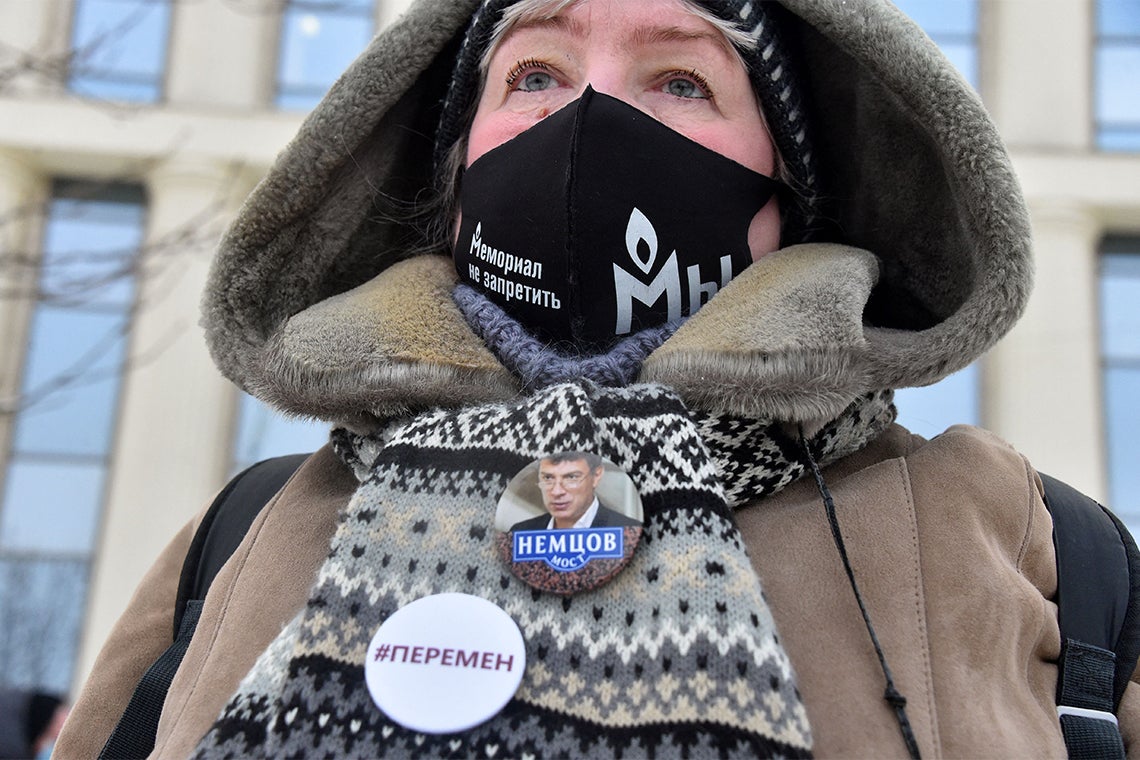Dissident literature: U of T researcher helps build 'an honest record' of Soviet history

Published: March 22, 2023
While the world continues to witness the exchange of bombs and gunfire in Ukraine, the University of Toronto’s Ann Komaromi is involved in the exchange of underground journalism and literature about the former Soviet Union.
For more than 20 years, Komaromi, an associate professor in the Faculty of Arts & Science’s department of Slavic languages and literatures and the director of the Centre for Comparative Literature, has been involved with Memorial, a Nobel Peace Prize-winning human rights organization that was founded in Russia during the fall of the Soviet Union to collect facts about repressions and civil society activity during Joseph Stalin's reign (1924-1953) and its aftermath.
The organization consisted of two entities: Memorial International, which documented Soviet-era history, including crimes against humanity; and the Memorial Human Rights Centre, which was focused on the protection of human rights – especially in conflict zones in and around modern Russia.
The Russian government ordered Memorial shut down in December 2021 and forced its closure earlier this year.
“The historians at Memorial, some of whom were activists in the dissident period, were not well paid. It was not glamorous and they were not particularly rewarded within their society for what they were doing,” says Komaromi. “That’s why it's important to support what they do and make sure it's well known.”
Komaromi first became connected to Memorial in the late 1990s while working on her PhD dissertation when she was a graduate student at the University of Wisconsin-Madison.
“I went to Moscow to do some research and went to the offices and met people there,” she says. “I became fascinated with the materials and information they had. You couldn't find it anywhere else.
“Researching topics that were not part of official history – that became the history of repression in the Stalinist era. Memorial’s efforts to commemorate and gather information about the victims of Stalin era represented the flagship work they were doing for many years. It's enormously significant.”

A woman wearing a face mask with the logo of Russia's rights group Memorial is seen outside the Moscow City Court where a hearing to dissolve the group's Human Rights Centre was taking place (photo by Vasily Maximov/AFP via Getty Images)
Komaromi assisted with Memorial’s efforts to capture the history of dissidence after Stalin which included recording and preserving the unofficial texts Russian citizens produced and circulated. By the mid-2000s, she was deeply involved in a collaboration to further study this publishing network, called "samizdat."

"We collaborated to work on a catalogue of underground publications," she says. Those publications included art and literary journals, rare copies of which are kept in an archive in Bremen, Germany, at the Institute for the Study of Eastern Europe.
Now, electronic editions of those underground journals are available with timelines of dissident movements and published interviews with activists on Komaromi’s digital humanities project site through University of Toronto Libraries.
Among the journals and publications shared and exchanged, the Chronicle of Current Events was regarded as the most widely read underground bulletin.
“They were recording facts about who had been arrested, who underwent interrogation,” says Komaromi. “It also shared what uncensored works were being passed around and what was being seized during searches. The emphasis was on facts. They wanted to keep emotion and politics out of it.
“But at the same time, there was this thriving poetry scene, there was theatre, fiction writing – all of this unofficial culture.”
Some of the fiction writing and poetry circulated included the works of some very well-known writers, such as Aleksandr Solzhenitsyn and Joseph Brodsky, who was exiled in the early 1970s for his poetry.
But most of the journalists and authors were relatively unknown.
To boost the exposure of their work, Komaromi published her book, Soviet Samzidat, last year, capturing the underground publishing scene between the 1950s and 1980s.
“It's about the publishing itself and the culture – and the rich content of that underground publishing network,” says Komaromi.
She continues to work with Memorial, despite it being shuttered by the Russian government.
“The Russian government needs to control the history of the Soviet Union for its political purposes today,” says Komaromi. “This was a very public signal that the government controlled the narrative about history and wouldn’t allow any independent work to be done.”
That won’t stop Komaromi.
“My research today has to do with dissident memoirs and looking at the ways that people who were involved with various kinds of rights activism described their lives and activities,” she says.
“There's still a form of Memorial functioning in Russia, but a lot of people needed to go abroad. In France, for example, the history of dissidence project is still going on through people working there. That's how I'm able to continue collaborating with them.”
For Komaromi, her work with Memorial has been the defining experience of her distinguished academic career and a reflection of her belief in democratic values.
“I find the commitment of the historians of Memorial inspiring, the way people have devoted so many years to the values they uphold,” she says. “I see what they do as deeply patriotic.
“They want to curate an honest record of the history of their own country for the good of their own people. I feel it's something that's crucially important for Russia and it’s also relevant globally – for all of us who care about fact-based discourse, individual rights and freedom of expression.
“We should all be concerned about the distortion of facts and violent suppression of rights to free speech because historical propaganda is being used to justify Russia's war in Ukraine.”



